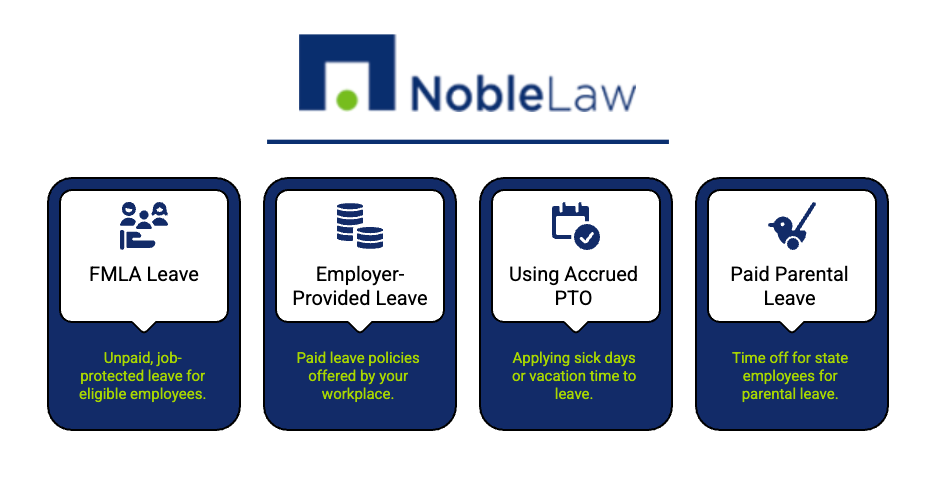A serious medical condition, whether it is you who is sick or a family member who requires your care, can significantly impact your ability to work. The federal Family and Medical Leave Act (FMLA) and Paid Family Leave (PFL) programs can help you through this time, but they have important differences you should know about.
At The Noble Law, we understand the tremendous difficulty of balancing a career with the demands that arise during a medical crisis. Our attorneys are here to help you understand the laws regarding medical leave and, if necessary, provide you with strong advocacy in a related dispute.
FMLA: Federally Protected Leave, No Pay
The Family and Medical Leave Act is a federal law that provides eligible employees with up to 12 weeks of unpaid time off per year for specific reasons related to health problems and medical events.
In order to qualify for FMLA leave, you must:
- Have worked for your employer for at least 12 months
- Have worked at least 1250 hours during the 12 months immediately preceding your leave
- Work for an employer who employs at least 50 people within 75 miles of the worksite
In addition, you must also qualify for one of the following reasons for taking FMLA leave:
- Caring for an immediate family member (spouse, child, parent) who suffers from a serious medical condition
- Suffering from a medical condition that prevents you from working
- Caring for a newborn infant
- Placement of a child through adoption or foster care
While the protections provided by the FMLA are strong, employers sometimes will attempt to unfairly deny, interfere with or retaliate against employees who assert their FMLA rights.
If you’ve been wrongfully denied leave, pressured to return early, or faced disciplinary action for taking protected time off, you don’t have to face this situation alone. The employment attorneys at The Noble Law stand up for employees who have suffered due to FMLA violations and will fight to hold employers accountable for violating your rights.
Paid Family Leave: State-Specific Wage Replacement
One of the key differences between FMLA and Paid Family Leave is that the latter can provide a portion of wage protection while the former does not.
A PFL, however, is a state-level program that is only mandated in certain states. At the present time, neither North Carolina or South Carolina have state-level PFL program, although individual employers may offer private plans that provide paid time off for certain events such as a serious medical event or the birth of a child.
Paid Parental Leave for State Employees
In North Carolina, certain state employees are eligible for Paid Parental Leave, which provides eight weeks of paid time off to employees who have given birth and four weeks of paid time off to other eligible employees to bond with and care for a child.
South Carolina offers similar protections to certain state employees, although the time-off allotments are six weeks for birthing parents and two weeks for non-birthing parents.
Know Your Rights to Make the Best Decisions Regarding Medical Leave
If you need time off due to a medical event in North Carolina or South Carolina, it is important to know your rights and explore all of the options available to you, including:
- FMLA leave, which may provide up to 12 weeks of unpaid, job-protected leave if you meet the eligibility criteria.
- Employer-provided paid leave, such as short-term disability or paid family leave policies offered at your workplace.
- Using accrued PTO, including sick days or vacation time, which may be applied to your leave depending on your employer’s policies.
- If you are a state employee, time off through a Paid Parental Leave program.
If you encounter any problems obtaining the leave that is rightfully yours, an experienced employment law attorney can evaluate your situation to determine the best course of action.
How an Employment Law Attorney Can Help
The attorneys at The Noble Law handle these situations routinely and possess a deep understanding of the underlying statutes and case law.
We can review the details of your employment, medical event, and communications you have had with your employer to determine if your rights have been violated under FMLA or private company leave policies.
Depending upon your specific circumstances, we may be able to assist by negotiating with your employer, filing a claim with the Department of Labor or other government agency, or pursuing legal action to help you recover lost wages, reinstatement of a job you have lost, or other appropriate remedies.
Get Legal Help for an FMLA or PFL Issue
At The Noble Law, we believe in fairness, and that means making sure every employee gets the paid time off and job protection to which they are entitled. If you need representation for an issue related to FMLA or other type of paid or unpaid leave in the Carolinas, we are here for you.
Contact us today to arrange a confidential consultation with an experienced employment law attorney who can protect your rights.
About The Noble Law Firm
The Noble Law is a women-owned employment law firm with offices in North Carolina and South Carolina, founded by Laura Noble in 2009. Specializing in wrongful termination, workplace harassment, workplace retaliation, workplace mediation, and neutral third-party investigations, the firm is committed to leveling the playing field for employees. Their focus is on delivering positive outcomes with empathy and integrity, while also driving societal change in employment law.
The firm emphasizes diversity, collaboration, and innovation, fostering a balanced work environment that values the personal lives of its staff. With a strong commitment to technology and efficiency, The Noble Law provides personalized attention to a select group of clients, handling cases involving harassment, discrimination, retaliation, and more. The team’s extensive litigation experience allows them to deliver thorough and assertive representation.


